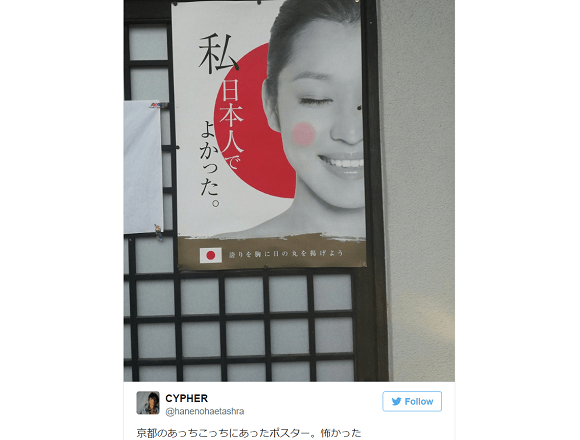
Mysterious posters draw concerned comments about the insensitive mentality of their anonymous creators.
Every city in Japan, is, of course, Japanese, but there are few that feel more so than Kyoto. Though it hasn’t been the nation’s political capital for almost 150 years, Kyoto remains the cultural capital for many traditional art forms and disciplines.
That exalted status makes Kyoto one of the most visited cities in Japan, with both domestic and international travelers coming to experience a touch of classical Japanese elegance. But while Kyoto’s “Japanese-ness” is a point of pride among local residents, some Twitter users feel that posters spotted in the city take the boasting too far.
https://twitter.com/hanenohaetashra/status/857606205216141312Japanese Twitter user @hanenohaetashra recently shared the above snapshot. The poster’s text, in its entirety, translates to:
“I’m glad I’m Japanese. Let’s raise the Hinomaru [Japanese flag] with pride in our hearts.”
“I’ve seen this poster here and there in Kyoto,” tweeted @hanenohaetashra. “It’s frightening.”
No indication is made of who produced or has been putting up the posters, though popular speculation is that they are made by a political or Shinto group with strong nationalistic leanings. Following @hanenohaetashra’s tweet, several others chimed in with their agreement that the message is a tone-deaf one to display in a city that not only prides itself on its hospitality, but has also become one of Japan’s major contact points with the rest of the global community.
京都市民ですヽ(´ー`)ノ 観光都市が情けない、恥ずかしい思いです。
— アランプロス党 (読み方 : アランプロストー) (@alainprostparty) April 30, 2017
https://twitter.com/hkemo1/status/858597050551746561“I’m a Kyotoite. For a town that’s such a sightseeing destination, this is pathetic, and embrassing.”
“I live in Kyoto. Yeah, I’ve seen these posters around. Speaking as a Kyotoite, they’re completely pathetic. If you could, please let me know where you saw them in town.”
怖い。こんなの貼って、京都のイメージ上がると思ってるのかなぁ?
— 山野林子 (@ssh_202) April 30, 2017
京都で興ざめだね。
“Creepy. Do they think putting these posters up will help Kyoto’s image? They’re screwing up the good reputation the city has built.”
Again, it should be reiterated that these posters bear no identifying marks, and do not appear to be the work of the municipal government or any official tourism organization. Twitter users have offered their theories into the psyches of the posters’ anonymous creators, however.
とりあえず、このポスターを作った人は、日本人であることに自信がないんだなってことは伝わった。
— ゆん@MTGアリーナ無課金勢 (@yun_line) April 29, 2017
“In any case, you can tell that the people who made this have no confidence in themselves that stems from being Japanese.”
アイデンティティの押売ほどウザいものはないな。
— okchibita (@okchibita) April 30, 2017
“Nothing makes you look more like an ass than beating your chest because of your own identity.”
It’s worth noting that Japan’s near-homogenous ethnic makeup makes it difficult to distinguish between societal and racial pride. Still, multiple online commenters felt that the posters are insensitive towards people of non-Japanese ancestry.
https://twitter.com/Takakazu/status/858520370307096577“This kind of thinking [exhibited on the poster] is dangerous unless you also have an understanding of and respect for other cultures as well. I hope whoever made these posters has those.”
へんなポスター。
— 🌈BASIL💙💛🌻 (@basilsauce) April 29, 2017
日本国籍を持たない外国籍市民の人たちや、京都なら多いであろう海外からの外国人旅行者の人たちから見ても、自分の存在はもしかしたらこの国では認められていないのか、と、とても怖くなるメッセージを発信しています。>京都のあっちこっちにあったポスター。怖かった https://t.co/Sm9ZCRONYV
“What a weird poster. When foreign residents of Kyoto or the city’s many overseas visitors see this, I wonder if it’ll make them feel like this country doesn’t accept their presence. It’s a very disturbing message that the posters are transmitting.”
Though the posters have been spotted in Kyoto, those who take issue with the possible implications discussed here will be happy to know that they’re not everywhere in the city, and at least one Kyoto resident, while troubled by them, said to have not noticed them before seeing @hanenohaetashra’s tweet. Still, for those who want Kyoto to retain its image as a symbol of Japanese society’s welcoming politeness, even a few such posters likely feels like too many.
Source: Togetter via Hachima Kiko
Featured image: Twitter/@hanenohaetashra

 The woman on the “I’m glad I’m Japanese” posters spotted in Kyoto? She’s actually Chinese
The woman on the “I’m glad I’m Japanese” posters spotted in Kyoto? She’s actually Chinese “Smooth Hair” poster sparks controversy in Japan
“Smooth Hair” poster sparks controversy in Japan Japanese man complains about foreign languages on Tokyo train, Twitter drowns him in kindness
Japanese man complains about foreign languages on Tokyo train, Twitter drowns him in kindness Hyakki Yagyo: Night Parade of 100 Demons scares tourists in Kyoto【Videos】
Hyakki Yagyo: Night Parade of 100 Demons scares tourists in Kyoto【Videos】 Japanese company tries to create motivational poster, accidentally creates demotivational poster
Japanese company tries to create motivational poster, accidentally creates demotivational poster Tokyo street sweets: The must-snack treats of Nakano’s Refutei
Tokyo street sweets: The must-snack treats of Nakano’s Refutei Starbucks Japan releases first-ever Hinamatsuri Girls’ Day Frappuccino
Starbucks Japan releases first-ever Hinamatsuri Girls’ Day Frappuccino The fish in rural Fukui that rivals Japan’s most auspicious sea bream
The fish in rural Fukui that rivals Japan’s most auspicious sea bream Japanese restaurant chain serves Dragon Ball donuts and Senzu Beans this spring
Japanese restaurant chain serves Dragon Ball donuts and Senzu Beans this spring Which convenience store onigiri rice balls are the most popular? Survey reveals surprising results
Which convenience store onigiri rice balls are the most popular? Survey reveals surprising results Studio Ghibli and Uniqlo team up for line of beautiful T-shirts and bags, but not in Japan【Pics】
Studio Ghibli and Uniqlo team up for line of beautiful T-shirts and bags, but not in Japan【Pics】 Japan’s first-ever wanko soba conveyor belt restaurant opens in Tokyo
Japan’s first-ever wanko soba conveyor belt restaurant opens in Tokyo Take a trip to Japan’s Dododo Land, the most irritating place on Earth
Take a trip to Japan’s Dododo Land, the most irritating place on Earth We taste the Adult Cream Pie from McDonald’s Japan
We taste the Adult Cream Pie from McDonald’s Japan Japanese drugstore sells onigiri at pre-stupid era prices, but how do they compare to 7-Eleven?
Japanese drugstore sells onigiri at pre-stupid era prices, but how do they compare to 7-Eleven? Highest Starbucks in Japan set to open this spring in the Tokyo sky
Highest Starbucks in Japan set to open this spring in the Tokyo sky The 10 most annoying things foreign tourists do on Japanese trains, according to locals
The 10 most annoying things foreign tourists do on Japanese trains, according to locals Tokyo Skytree turns pink for the cherry blossom season
Tokyo Skytree turns pink for the cherry blossom season Yakuzen ramen restaurant in Tokyo is very different to a yakuza ramen restaurant
Yakuzen ramen restaurant in Tokyo is very different to a yakuza ramen restaurant Shibuya Station’s Hachiko Gate and Yamanote Line stairway locations change next month
Shibuya Station’s Hachiko Gate and Yamanote Line stairway locations change next month Starbucks Japan releases new sakura goods and drinkware for cherry blossom season 2026
Starbucks Japan releases new sakura goods and drinkware for cherry blossom season 2026 Starbucks Japan adds new sakura Frappuccino and cherry blossom drinks to the menu
Starbucks Japan adds new sakura Frappuccino and cherry blossom drinks to the menu Japan Extreme Budget Travel! A trip from Tokyo to Izumo for just 30,000 yen [Part 1]
Japan Extreme Budget Travel! A trip from Tokyo to Izumo for just 30,000 yen [Part 1] Japan’s new “Cunte” contact lenses aren’t pronounced like you’re probably thinking they are
Japan’s new “Cunte” contact lenses aren’t pronounced like you’re probably thinking they are Japan’s newest Shinkansen has no seats…or passengers [Video]
Japan’s newest Shinkansen has no seats…or passengers [Video] Foreigners accounting for over 80 percent of off-course skiers needing rescue in Japan’s Hokkaido
Foreigners accounting for over 80 percent of off-course skiers needing rescue in Japan’s Hokkaido Super-salty pizza sends six kids to the hospital in Japan, linguistics blamed
Super-salty pizza sends six kids to the hospital in Japan, linguistics blamed Starbucks Japan unveils new sakura Frappuccino for cherry blossom season 2026
Starbucks Japan unveils new sakura Frappuccino for cherry blossom season 2026 Foreign tourists in Japan will get free Shinkansen tickets to promote regional tourism
Foreign tourists in Japan will get free Shinkansen tickets to promote regional tourism Naruto and Converse team up for new line of shinobi sneakers[Photos]
Naruto and Converse team up for new line of shinobi sneakers[Photos] Is China’s don’t-go-to-Japan warning affecting the lines at a popular Tokyo gyukatsu restaurant?
Is China’s don’t-go-to-Japan warning affecting the lines at a popular Tokyo gyukatsu restaurant? Survey asks foreign tourists what bothered them in Japan, more than half gave same answer
Survey asks foreign tourists what bothered them in Japan, more than half gave same answer Japan’s human washing machines will go on sale to general public, demos to be held in Tokyo
Japan’s human washing machines will go on sale to general public, demos to be held in Tokyo Starbucks Japan releases new drinkware and goods for Valentine’s Day
Starbucks Japan releases new drinkware and goods for Valentine’s Day We deeply regret going into this tunnel on our walk in the mountains of Japan
We deeply regret going into this tunnel on our walk in the mountains of Japan Studio Ghibli releases Kodama forest spirits from Princess Mononoke to light up your home
Studio Ghibli releases Kodama forest spirits from Princess Mononoke to light up your home Major Japanese hotel chain says reservations via overseas booking sites may not be valid
Major Japanese hotel chain says reservations via overseas booking sites may not be valid Put sesame oil in your coffee? Japanese maker says it’s the best way to start your day【Taste test】
Put sesame oil in your coffee? Japanese maker says it’s the best way to start your day【Taste test】 No more using real katana for tourism activities, Japan’s National Police Agency says
No more using real katana for tourism activities, Japan’s National Police Agency says Japanese Twitter goes crazy for impromptu piano performance at Yodobashi Camera store in Kyoto
Japanese Twitter goes crazy for impromptu piano performance at Yodobashi Camera store in Kyoto Kyoto’s Kinkakuji creates unusual photo opportunity for visitors
Kyoto’s Kinkakuji creates unusual photo opportunity for visitors Nintendo’s Kyoto headquarters is back to normal after replacing N that blew away in typhoon
Nintendo’s Kyoto headquarters is back to normal after replacing N that blew away in typhoon “No seeds, please.” Pigeons in Japanese anti-birdfeed posters show startling self-awareness
“No seeds, please.” Pigeons in Japanese anti-birdfeed posters show startling self-awareness Twitter users request anime analogies to better comprehend the magnitude of Japan’s rugby win
Twitter users request anime analogies to better comprehend the magnitude of Japan’s rugby win Japanese Twitter user gets Machamp clothes in lucky bag…but not in the way you think
Japanese Twitter user gets Machamp clothes in lucky bag…but not in the way you think Japanese Twitter user creates terrifying ‘fluorescent’ rice balls
Japanese Twitter user creates terrifying ‘fluorescent’ rice balls Travel to Kyoto on the Kyotrain: A Japanese train with interiors like a traditional Kyoto house
Travel to Kyoto on the Kyotrain: A Japanese train with interiors like a traditional Kyoto house Nara deer have a heartfelt message for tourists in new travel poster
Nara deer have a heartfelt message for tourists in new travel poster Red, white… Beige? Twitter user overhears a children’s song with creepy implications
Red, white… Beige? Twitter user overhears a children’s song with creepy implications Japanese Twitter user accidentally summons demon by making toast【Pic】
Japanese Twitter user accidentally summons demon by making toast【Pic】 Japanese Twitter user documents month-long crusade to buy a drink from a vending machine
Japanese Twitter user documents month-long crusade to buy a drink from a vending machine Kyoto’s Kamogawa River turned blood-red, and no one knows why【Video】
Kyoto’s Kamogawa River turned blood-red, and no one knows why【Video】 Japanese Twitter user’s dream of having a pet hamster is a roller-wheel of emotions
Japanese Twitter user’s dream of having a pet hamster is a roller-wheel of emotions Cool design on Japanese posters lets you look at kanji upside-down for a whole new meaning
Cool design on Japanese posters lets you look at kanji upside-down for a whole new meaning